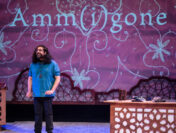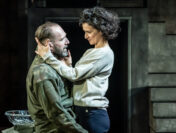 It seems fitting to write a review of the Arena Stage at the Mead Center for American Theater’s delightful production of Roe in the wake of the nation-wide Women’s March this past weekend. Whether Molly Smith was clairvoyant or it was a coincidence, Roe could not be more timely as a woman’s right to choose finds itself in the crosshairs of the first of potentially many Executive Actions signed only three days into the new President’s term. The production had to imagine it would air in a different climate, but the historical retelling of the advent of choice is a beacon of interest today.
It seems fitting to write a review of the Arena Stage at the Mead Center for American Theater’s delightful production of Roe in the wake of the nation-wide Women’s March this past weekend. Whether Molly Smith was clairvoyant or it was a coincidence, Roe could not be more timely as a woman’s right to choose finds itself in the crosshairs of the first of potentially many Executive Actions signed only three days into the new President’s term. The production had to imagine it would air in a different climate, but the historical retelling of the advent of choice is a beacon of interest today.
As in previous productions ( Sweat, All the Way), the Arena Stage collaboration with the Oregon Shakespeare Festival and the Berkeley Repertory Theatre has produced another gem. The tone of playwright Lisa Loomer’s Roe is accessible, clever, and sharply humorous, with characters wryly self-deprecating with the wisdom of hindsight. With shades of Our Town, characters pierce the fourth wall, turning to the audience after their part to share their own obituary. The direct communication and movement through time remind us that we aren’t watching a story frozen in history, merely affecting its characters. We are watching the voltage lever being pulled on a circuit that remains hot, and affects every citizen in America, today. As the present-day  characters tell dueling versions of the past through their best-selling books, Loomer also concedes wry recognition of the faults in any historical retelling of a story by its flawed human participants.
characters tell dueling versions of the past through their best-selling books, Loomer also concedes wry recognition of the faults in any historical retelling of a story by its flawed human participants.
Roe tells the origin story of Roe v. Wade, and the personal and ideological disagreements between the two main characters, told from 1969 through today. Norma McCorvey (given the alias “Jane Roe” in legal documents to protect her identity) is a young, impoverished lesbian of questionable education seeking an abortion in Dallas in 1970 (played with wild unrestraint by Sara Bruner). Sarah Weddington is the 26-year old lawyer and feminist from Austin who conceived the case and took it to the U.S. Supreme Court (played with a Hillary Clinton like remoteness, polish, and focus by Sarah Jane Agnew). McCorvey and Weddington tell their story in the past tense, speaking as present day narrators – characters far evolved both physically and personally from where they started (Weddington’s increasingly padded figure is a nice touch of veritas). A talented and protean cast of twelve play the remaining characters. Catherine Castellanos delivers a standout performance as Connie Gonzalez, Norma’s long suffering and stoic partner, offering perhaps the most authentic character on stage. Susan Lynskey is comedically delightful in all her roles, but especially as second chair lawyer Linda Coffee.
conceived the case and took it to the U.S. Supreme Court (played with a Hillary Clinton like remoteness, polish, and focus by Sarah Jane Agnew). McCorvey and Weddington tell their story in the past tense, speaking as present day narrators – characters far evolved both physically and personally from where they started (Weddington’s increasingly padded figure is a nice touch of veritas). A talented and protean cast of twelve play the remaining characters. Catherine Castellanos delivers a standout performance as Connie Gonzalez, Norma’s long suffering and stoic partner, offering perhaps the most authentic character on stage. Susan Lynskey is comedically delightful in all her roles, but especially as second chair lawyer Linda Coffee.
 The production is extremely well staged. Loomer does a stellar job of humanizing every character, and Director Bill Rausch lets the actors take center stage. Set Designer Rachel Hauck and Lighting Designer Jane Cox effortlessly transport us from a 1970s lesbian disco to the Supreme Court, with minimal set clutter, and simple, fluid adjustments. Raquel Barreto’s costumes guide the audience through time. Projection Designer Wendall K. Harrington creates one of the show’s standout moments, airing the original recording of the Supreme Court justices interrogating the case. A special nod must go to the wigs team Lashawn Melton and Natalie Flango – the extraordinary wig parade was a character in itself.
The production is extremely well staged. Loomer does a stellar job of humanizing every character, and Director Bill Rausch lets the actors take center stage. Set Designer Rachel Hauck and Lighting Designer Jane Cox effortlessly transport us from a 1970s lesbian disco to the Supreme Court, with minimal set clutter, and simple, fluid adjustments. Raquel Barreto’s costumes guide the audience through time. Projection Designer Wendall K. Harrington creates one of the show’s standout moments, airing the original recording of the Supreme Court justices interrogating the case. A special nod must go to the wigs team Lashawn Melton and Natalie Flango – the extraordinary wig parade was a character in itself.
What do a hard-living, hard-drinking, partying bartender seeking an abortion for her third pregnancy, and an extremely driven, intelligent, and groomed young feminist law grad have in common? As the imagined interaction between them will show, not much past the name “Roe.” Roe is a well-researched play that takes a story you think you know and surprises you with details that you didn’t.
Loomer presents the divisive issue of reproductive rights in a balanced, respectful manner, and closes the play with a  reminder that this issue is as unresolved and relevant as ever. Circulating among attendees after the show, the response was universal: it presented the best arguments from both sides equally. As one guest said: I’m pro-choice so I saw a pro-choice show, but I could see how a pro-life person would see a pro-life show.” While the second half drags a bit, the surprisingly funny play never really lets you out of its grip. It’s a fascinating retelling of a history you never knew, and sly wink to the unavoidable bias of retelling any history through its players. It could not be more timely, and should be seen.
reminder that this issue is as unresolved and relevant as ever. Circulating among attendees after the show, the response was universal: it presented the best arguments from both sides equally. As one guest said: I’m pro-choice so I saw a pro-choice show, but I could see how a pro-life person would see a pro-life show.” While the second half drags a bit, the surprisingly funny play never really lets you out of its grip. It’s a fascinating retelling of a history you never knew, and sly wink to the unavoidable bias of retelling any history through its players. It could not be more timely, and should be seen.
Roe is playing at Arena Stage at the Mead Center for American Theater through Feb. 19, 2017 (1101 Sixth St. SW, Washington DC 20024). Running time: 2 hours 20 minutes with one 15 minute intermission. For information or tickets call 202-488-3300 or click here.
Photo credit: C. Stanley Photography





